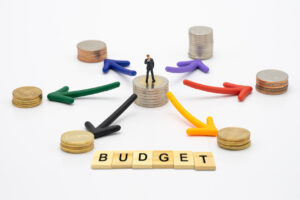Effectively managing your finances requires more than just drafting your budget and trying to hope for the most favorable. The distinction between the two boils down to one easy task: that is, to conduct regular reviews of your budget. This systematic method of examining the way you spend money, your income pattern, and your financial goals could transform the way you view money and set you on the path to the long-term stability of your finances.
The monthly budget reviews act as your financial compass, aiding you in navigating the maze of modern-day spending while keeping your objectives within reach. When you set aside time each month to review your financial results, you will gain important insights into your spending habits and be able to make informed decisions regarding your spending plans for the future. This helps you be in control of your finances instead of letting them dictate your spending.
Understanding Your Current Financial Situation
Budget reviews every month provide clarity about where your money will go and not where you think it should go. Many people have preconceived notions regarding their spending habits, which do not reflect the reality. When you take the time to look over your budget for the month and expenses, you’re forced to face the facts about your financial behavior. This involves looking over every single transaction, categorizing expenditures, and comparing the real-time spending with your budget.
The process of review uncovers patterns that would otherwise be overlooked. It is possible to realize that your shopping budget often exceeds your expectations because impulse purchases or subscription services are draining your bank account in a subtle way. This information isn’t intended to make you feel guilty but to give you a sense of awareness that leads to more informed decisions. Knowing your current situation is the basis for making real changes.
Setting Financial Goals
Monthly budget reviews provide the responsibility for your financial goals. Plans that don’t get checked in regularly often end up being unremembered resolutions. When you examine your budget each month, it helps you remember what you’re working towards and evaluate your progress regularly. The regular reminders help maintain the motivation of your goals and keep them at the top of your list when making financial choices.
Reviewing your progress lets you break up larger goals into achievable monthly goals. If you’re saving money for an emergency fund, vacation, or major purchase, periodic reviews can help you determine whether you’re on track to meet your goals. This method of granularity makes the most ambitious goals seem more manageable and allows you to celebrate small victories as you go.
Identifying Spending Patterns
A very important feature of monthly budget reviews is the ability to recognize patterns. As time passes, you’ll start to recognize patterns in your spending habits, which will inform your future financial decisions. It could be that you are spending more at certain times of the year, in particular areas, or in certain emotional situations. This information allows you to plan your budget in advance instead of reacting to financial shocks.
The seasonal spending patterns are apparent by observing a consistent review of your monthly budget. Back-to-school expenses, holiday costs, and summer vacation expenses all fall into regular patterns. By being aware of these patterns, you can make savings on time and not have stress from huge expenses that are not expected. This method of thinking ahead eliminates the need to depend upon a credit card or other emergency cash for affordable costs.
Adjusting Your Budget
The budget isn’t just a one-time document but a constantly evolving instrument that needs to evolve as you live. The monthly reviews are the ideal chance to make any necessary adjustments in light of current performance and the changing conditions. If you regularly overspend in a particular category, it is possible to increase the budget or figure out ways to lower expenses in that particular area.
Budget adjustments should not be seen as failures, but rather as improvements that increase accuracy and efficiency. The initial budget is an educated guess, based on the limited information available. Monthly reviews give you the information necessary to help make your budget more realistic and effective. The process continues to build up until you have an actual budget that reflects your lifestyle and values.
Avoiding Common Pitfalls
The monthly budget reviews act as an initial warning signal for any potential financial troubles. By reviewing your spending habits regularly, you are able to identify worrying trends before they turn into grave issues. As credit card balances increase, declining savings rates or rising subscription fees can be identified and addressed in monthly reviews.
The process of reviewing also helps to prevent lifestyle inflation from hindering your financial objectives. When your income grows, it’s normal for expenditure to rise too. If you don’t keep a close eye on that, this growth in spending can take up all the additional income and hinder progress towards financial goals. Regular reviews make sure that an increase in earning capacity translates into greater financial security, not just increased costs.
Tools and Resources
Technology has enabled monthly reviews of your budget to be easier and more efficient than they ever were. Budgeting software can automate categorizing transactions, monitor the budget against spending, and create useful reports. These apps eliminate a large portion of the manual labor usually associated with budget tracking and help make reviewing the process more enjoyable and informative.
Spreadsheet templates are a great option for those who want greater control over budget tracking. There are a variety of free templates available online, and you can develop your own system that is customized to suit your needs. It’s important to choose the right tool to utilize regularly. The most effective budgeting tool is one that’s compatible with your lifestyle and personal preferences.
Websites for credit and banks frequently offer tools for analyzing spending that complement your monthly reports. These tools can help you discern patterns in spending and offer explanations for your financial habits. Some institutions also offer alerts to notify you when you’re nearing your budget limits or when you make unexpected purchases.
Building Long-Term Financial Success
Budget reviews are about more than just tracking numbers; they’re about establishing a lifelong awareness of finances and a disciplined approach. The habits you establish through regular budget reviews—mindful spending, goal-oriented savings, and a proactive financial plan of action—over time yield significant financial rewards.
The consistent nature of the monthly reviews triggers a feedback loop that continually enhances decisions you make regarding your finances. Every review can provide lessons to help you make better decisions in the future, gradually increasing your financial acumen and confidence. This changes budgeting from a chore into a lifelong technique that helps you reach your bigger ambitions and goals.
FAQs
1. How long will an annual budget review last?
A complete monthly budget review usually takes between 30 and 60 minutes, according to the amount of money you have as well as the software you utilize. The amount of time you invest is negligible when compared to the financial rewards you’ll get.
2. What happens if I discover that I’ve spent too much on various types?
It is normal to overspend, particularly at the beginning of your budgeting process. Utilize these tips to tweak your financial plan for the coming month, whether by increasing the amount allocated to overspent categories or by looking for ways to cut costs.
3. Do I need to include my spouse in the monthly budget reviews?
If you have financial obligations with a partner, performing reviews in tandem ensures that you’re aware of your financial position and working toward similar objectives. This type of collaboration improves your financial relationship and increases accountability.
4. What’s the most suitable month to review your budget?
A lot of people find the initial few days of the new month to be ideal to review the previous month’s results. This time frame allows you to review your previous month’s budget and establish goals for the coming month.
5. How can I remain motivated to do regular reviews every month?
Focus on the positive outcomes rather than perceiving reviews as a duty. Recognize progress towards your goals and remember that every review is a step further towards financial freedom. Think about pairing reviewing with something you enjoy, such as your favorite music or coffee.




